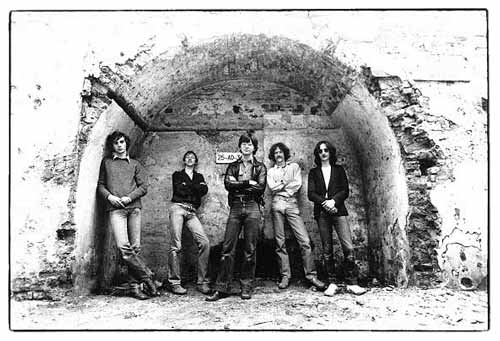
|
|
The best place in Deventer to buy progressive rock-records was a record-store called 'Platent'. Owner Han van de Graaf got interested in the idea of Lady Lake making an album and decided to start the Q-Records label. In October 1977, Lady Lake went to the very nearby village of Wijhe to record their debutalbum at the 'MiraSound Studio'. The album was named 'No Pictures' because one Sunday a photographer for the local Deventer newspaper failed to show up for a photo-shoot (Sorry, Ron!). Stanley Dijkhuis, a singer friend, was invited to do the vocals on two tracks. About 1.200 copies of 'No Pictures' were made and sold and rumour has it that a considerable number of copies was exported to Scandinavia and Italy. 'Magic Twanger' - after which song this site is named - already existed in different versions since about 1972 from the Lady Lake I period. 'Between Bremen and Hamburg' originated partly from the 1975 Delay repertoire (Part II) and 1976 (Part III). Part I and the rest of the material on 'No Pictures' was composed during 1977. 'No More Gentle Treatment's original length was shortened to the LP-version. Intended as a tribute to Gentle Giant, this piece soon became one of the heavy rocking highlights of the Lady Lake live shows. On the album though, the band didn't quite manage to capture the rocking feel of this piece. |
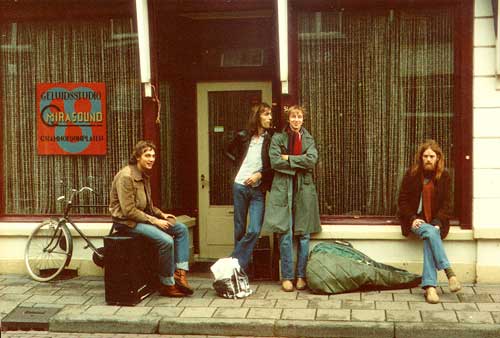 |
|
to show up at Mirasound recording studio. |

|
|
"No Pictures" concluded the Lady Lake II period. The band did not feel totally comfortable with the result of their studio-efforts. During their live-shows Lady Lake sounded a lot heavier than on the album. In order to increase the heavy live sound, another guitarplayer was added. Ernst Houwaart joined the band for a short period and later founded the band Sprint together with Hans Hulshof (bass) and Jan Dubbe (drums). Joop van Leeuwen left Lady Lake in 1979 to join Delay with whom he would record the album "Songs Of Innocence" (1983). Jan Dubbe was asked to join Lady Lake and so another Deventer circle was closed. Sprint, who found a new drummer in Mark van de Poel, became rather wellknown touring Holland as a supporting act for the 1980 Dutch New Wave sensation MO. Sadly, Ernst Houwaart died a few years ago. |
|
Photo by Ronald van Caem |

|
|
The members of Lady Lake spent the summer of 1979 composing and rearranging new and old material. The band's music began to develop into a truly original and elusive direction, maybe mainly because of the fact that no member had ever had any relevant or serious musical training whatsoever. Apart from the normal small venues the band did quite a lot of bigger gigs together with Earth & Fire, Finch, Partner and Solution as well as other, still wellknown, Dutch progressive bands. Lady Lake also played numerous regional and national radioshows and festivals. There were several prestigious invitations, like the "Oor" (Dutch music magazine) band presentation in the Amsterdam Paradiso and the Music Maker Day (a national showcase in the Jaarbeurshallen Utrecht, organized by the still very popular Dutch musician's magazine of the same name). The annual New Year's Concert, often with other Deventer bands like Ninety Nine as guests, became a sort of tradition in Deventer. One of these concerts (1980) also staged the first public showing of "The Rock Connection", a "Godfather-pastiche" directed by former drummer Peter Schoemaker. |
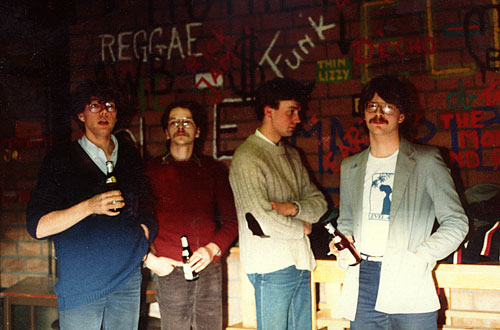
|
|
|
|
Halfway 1980 Ton van Erp replaced Eddy Bakker on bass and Ton, being a genuine virtuoso on his instrument, broadened Lady Lake's music even more. Gerard Meuleman, an old friend from Deventer, joined as a singer. Still, the band's enthusiasm could not counter the lack of public interest in their music. Punk and New Wave became more and more popular and the members of Lady Lake weren't really able to devote as much time to the band as they were used to, due to the usual obligations such as studies and jobs. Actually, Lady Lake never seriously thought about becoming professional musicians; apart from being called progressive we were realistic as well. And, of course, utterly boring. Ton van Erp, to no one's surprise, did become a professional, as he was the only classically trained member of the band. So, in 1982 the band broke up.... |
|
|
|
|

|
|
During the autumn of 1985 the weirdest sounds could be heard coming from a safe in a cellar under a former bankbuilding in the center of Deventer. It wasn't really a band, more a group of enthusiasts who couldn't really live without making music. Hans Hulshof (bass, Chapman Stick), Fred Rosenkamp (guitars), Gerard Meuleman (vocals) and Jan Dubbe (drums) had decided to get together again on a regular basis and do what they still so very much liked to do. Later that year they moved to the legendary "Jo Jansen recording/rehearsal studio" ("You don't know the meaning of Rock & Roll until you've been poisoned by the smell of Jo's barn" is an expression that can still be heard regularly around Deventer) to rehearse and even to record. Soon after Gerard left, Berend Dubbe (keyboards, vocals) and Jerry van der Wolf (guitar-synthesizer), both ex-Autumn's Daughter, joined to form a group who got together about once a month. What has been left of this band on cassette-tapes still sounds very intrigueing and promising, but, alas, there are no really usable recordings. This band without a name was the closest we ever got to writing "real" songs in a rather unique Gabriel-meets-Doors-meet-Fripp-pastiche. Apart from being the only person who survived playing Jo Jansen's mouth "organ", Berend became a founding member of the much celebrated Dutch band Bettie Serveert, named after a more or less famous, but indeed very charming Dutch tennisplayer. Bettie Serveert had some of their covers designed by our mutual friend Roel Siebrand who so graciously offered his talents for this reissue as well. Berend Dubbe is currently getting a career going with girlfriend Sonja van Hamel under the name of Bauer. Extremely recommended! |
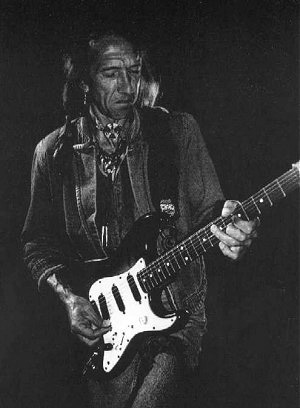
|
Left: Henk Haanraads, aka The Chief Right: Bauers' Berend & Sonja |
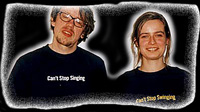
|
| Somewhere in 1989 Leendert and Jan met Henk Haanraads through their mutual friend Sip Zwart (famous for frying fish, Dutch gin and dental care). Henk, a guitarplayer extraordinaire, asked them to join his (probably lifelong) Steve Morse project. They accepted and still play Dixie Dregs/Dregs/Steve Morse music, and even perform, on a fairly regular basis, just for fun. |
